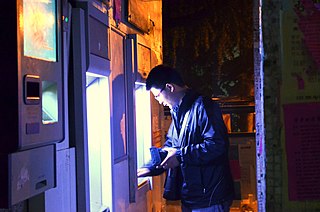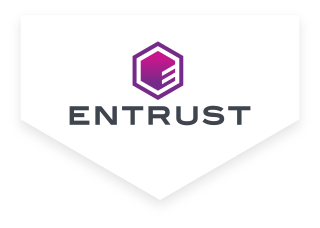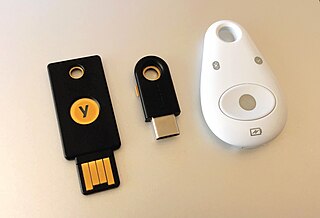An authenticator is a means used to confirm a user's identity, that is, to perform digital authentication. A person authenticates to a computer system or application by demonstrating that he or she has possession and control of an authenticator. In the simplest case, the authenticator is a common password.

Authentication is the act of proving an assertion, such as the identity of a computer system user. In contrast with identification, the act of indicating a person or thing's identity, authentication is the process of verifying that identity. It might involve validating personal identity documents, verifying the authenticity of a website with a digital certificate, determining the age of an artifact by carbon dating, or ensuring that a product or document is not counterfeit.
Dermot Desmond is an Irish businessman and financier. He is estimated to be worth €2.04 billion and is ranked by the Sunday Independent as the ninth-richest person in Ireland.

A security token is a peripheral device used to gain access to an electronically restricted resource. The token is used in addition to, or in place of, a password. Examples of security tokens include wireless keycards used to open locked doors, a banking token used as a digital authenticator for signing in to online banking, or signing a transaction such as a wire transfer.

Gemalto was an international digital security company providing software applications, secure personal devices such as smart cards and tokens, e-wallets and managed services. It was formed in June 2006 by the merger of two companies, Axalto and Gemplus International. Gemalto N.V.'s revenue in 2018 was €2.969 billion.
A digital wallet, also known as an e-wallet or mobile wallet, is an electronic device, online service, or software program that allows one party to make electronic transactions with another party bartering digital currency units for goods and services. This can include purchasing items either online or at the point of sale in a brick and mortar store, using either mobile payment or using a laptop or other personal computer. Money can be deposited in the digital wallet prior to any transactions or, in other cases, an individual's bank account can be linked to the digital wallet. Users might also have their driver's license, health card, loyalty card(s) and other ID documents stored within the wallet. The credentials can be passed to a merchant's terminal wirelessly via near field communication (NFC).
Electronic authentication is the process of establishing confidence in user identities electronically presented to an information system. Digital authentication, or e-authentication, may be used synonymously when referring to the authentication process that confirms or certifies a person's identity and works. When used in conjunction with an electronic signature, it can provide evidence of whether data received has been tampered with after being signed by its original sender. Electronic authentication can reduce the risk of fraud and identity theft by verifying that a person is who they say they are when performing transactions online.

Entrust Corp., formerly Entrust Datacard, provides software and hardware used to issue financial cards, e-passport production, user authentication for those looking to access secure networks or conduct financial transactions, trust certificated for websites, mobile credentials, and connected devices. The privately-held company is based in Shakopee, Minnesota and employs more than 2,500 people globally.
L-1 Identity Solutions, Inc. is a large American defense contractor in Connecticut. It was formed on August 29, 2006, from a merger of Viisage Technology, Inc. and Identix Incorporated. It specializes in selling face recognition systems, electronic passports such as Fly Clear, and other biometric technology to governments such as the United States and Saudi Arabia. It also licenses technology to other companies internationally, including China.

Multi-factor authentication is an electronic authentication method in which a user is granted access to a website or application only after successfully presenting two or more pieces of evidence to an authentication mechanism. MFA protects personal data—which may include personal identification or financial assets—from being accessed by an unauthorized third party that may have been able to discover, for example, a single password.
A trusted execution environment (TEE) is a secure area of a main processor. It helps code and data loaded inside it to be protected with respect to confidentiality and integrity. Data integrity prevents unauthorized entities from outside the TEE from altering data, while code integrity prevents code in the TEE from being replaced or modified by unauthorized entities, which may also be the computer owner itself as in certain DRM schemes described in SGX. This is done by implementing unique, immutable, and confidential architectural security such as Intel Software Guard Extensions which offers hardware-based memory encryption that isolates specific application code and data in memory. Intel SGX allows user-level code to allocate private regions of memory, called enclaves, which are designed to be protected from processes running at higher privilege levels. A TEE as an isolated execution environment provides security features such as isolated execution, integrity of applications executing with the TEE, along with confidentiality of their assets. In general terms, the TEE offers an execution space that provides a higher level of security for trusted applications running on the device than a rich operating system (OS) and more functionality than a 'secure element' (SE).

The FIDOAlliance is an open industry association launched in February 2013 whose stated mission is to develop and promote authentication standards that "help reduce the world’s over-reliance on passwords". FIDO addresses the lack of interoperability among devices that use strong authentication and reduces the problems users face creating and remembering multiple usernames and passwords.
Keeper Security, Inc. (Keeper) is a provider of zero-knowledge security and encryption software covering password management, secrets management, connection management, privileged access management, dark web monitoring, digital file storage, and encrypted messaging, among other offerings.

EyeVerify, Inc. is a biometric security technology company based in Kansas City, Missouri owned by Ant Group. Its chief product, Eyeprint ID, provides verification using eye veins and other micro-features in and around the eye. Images of the human eye are used to authenticate mobile device users. EyeVerify licenses its software for use in mobile banking applications, such as those offered by Tangerine Bank, NCR/Digital Insight and Wells Fargo.
Clear Secure, Inc. is an American technology company that operates biometric travel document verification systems at some major airports and stadiums.
Usher is an enterprise security platform released by Microstrategy, Inc. in 2015. The technology is designed to replace user-entered passwords with biometric identity and multi-step authentication methods, and features digital badges and geo-fencing administration options. The service takes the form of a mobile application that allows users to access both physical and digital space based on more passive identification methods.
OneSpan is a publicly traded cybersecurity technology company based in Boston, Massachusetts, with offices in Montreal, Brussels and Zurich. The company offers a cloud-based and open-architected anti-fraud platform and is historically known for its multi-factor authentication and electronic signature software.
Biometric tokenization is the process of substituting a stored biometric template with a non-sensitive equivalent, called a token, that lacks extrinsic or exploitable meaning or value. The process combines the biometrics with public-key cryptography to enable the use of a stored biometric template for secure or strong authentication to applications or other systems without presenting the template in its original, replicable form.
Web Authentication (WebAuthn) is a web standard published by the World Wide Web Consortium (W3C). WebAuthn is a core component of the FIDO2 Project under the guidance of the FIDO Alliance. The goal of the project is to standardize an interface for authenticating users to web-based applications and services using public-key cryptography. WebAuthn credentials are sometimes referred to as passkeys.
A mobile driving licence is a mobile app that replaces a physical driver's license. An International Organization for Standardization (ISO) standard for the mobile driving licence was approved on August 18, 2021 and published on 30 September 2021.






